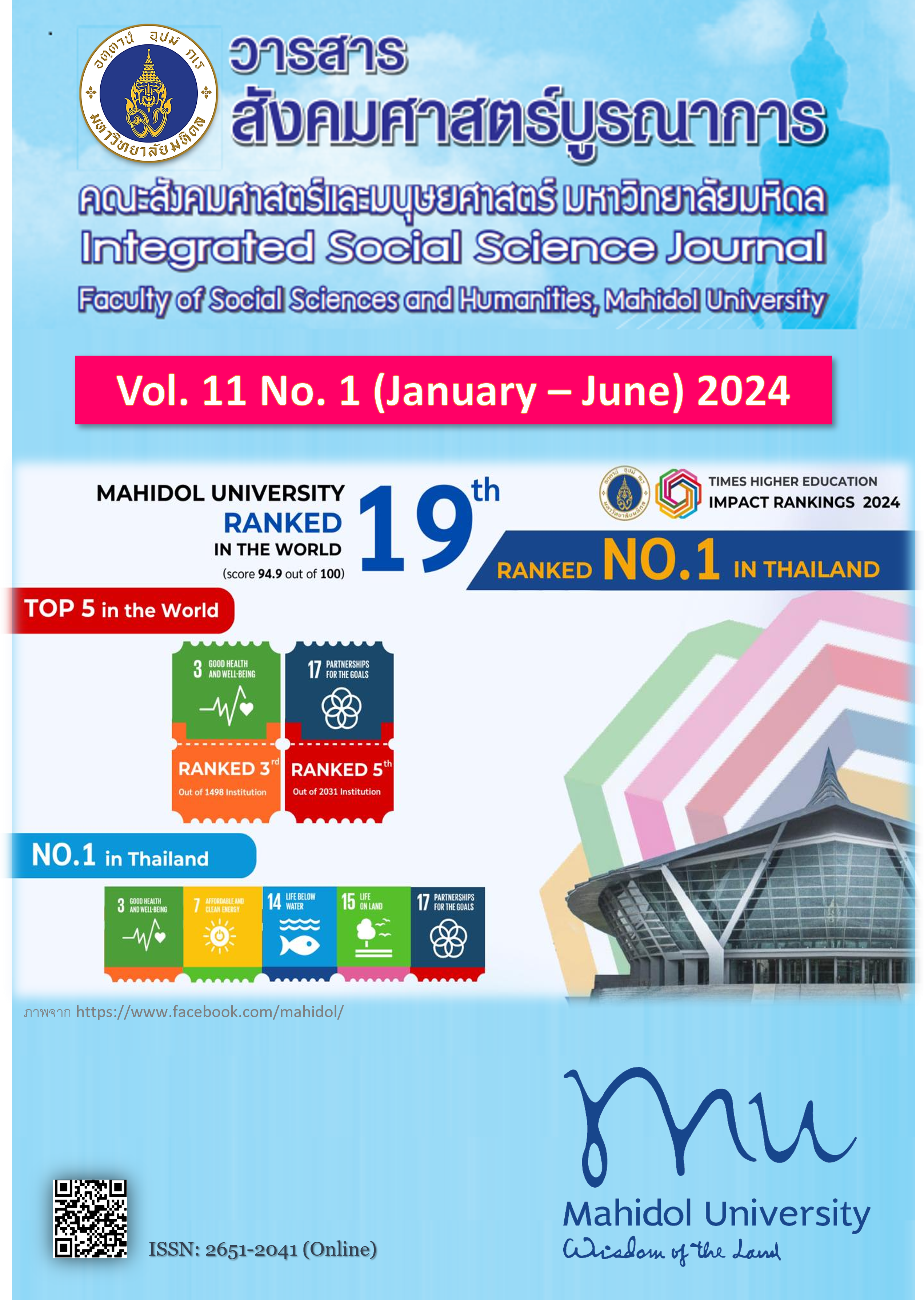ทัศนคติที่มีต่อการขอกำหนดตำแหน่งทางวิชาการของบุคลากรสายวิชาการ: กรณีศึกษาวิทยาลัยนานาชาติ มหาวิทยาลัยมหิดล
Main Article Content
บทคัดย่อ
การวิจัยนี้มีวัตถุประสงค์เพื่อศึกษาทัศนคติและปัจจัยส่วนบุคคลของพนักงานสายวิชาการ วิทยาลัยนานาชาติ มหาวิทยาลัยมหิดลที่มีต่อการขอกำหนดตำแหน่งทางวิชาการ การวิจัยนี้เป็นการวิจัยเชิงปริมาณ ใช้แบบสอบถามเป็นเครื่องมือในการสำรวจทัศนคติด้านความคิดเห็นทั่วไป กฎระเบียบที่เกี่ยวข้อง และอุปสรรคต่าง ๆ ในการขอกำหนดตำแหน่งทางวิชาการ โดยกลุ่มตัวอย่างคือพนักงานสายวิชาการ วิทยาลัยนานาชาติ มหาวิทยาลัยมหิดล จำนวน 50 คน ผลการวิจัยพบว่า (1) ความคิดเห็นของพนักงานสายวิชาการที่มีต่อการขอกำหนดตำแหน่งทางวิชาการด้านความคิดเห็นทั่วไปโดยรวมมีคะแนนเฉลี่ยอยู่ในระดับมาก (= 3.47) (2) ความคิดเห็นของพนักงานสายวิชาการที่มีต่อการขอกำหนดตำแหน่งทางวิชาการด้านกฎระเบียบข้อบังคับโดยรวมมีคะแนนเฉลี่ยอยู่ในระดับปานกลาง (= 2.81) และ (3) ความคิดเห็นของพนักงานสายวิชาการที่มีต่อการขอกำหนดตำแหน่งทางวิชาการด้านหน่วยงานที่ดูแลการขอตำแหน่งทางวิชาการโดยรวมมีคะแนนเฉลี่ยอยู่ในระดับมาก (= 3.66) จากการวิจัยโดยภาพรวม พนักงานสายวิชาการมีทัศนคติเชิงบวกต่อการขอกำหนดตำแหน่งทางวิชาการ พวกเขาคิดว่าการการมีตำแหน่งทางวิชาการเป็นสิ่งที่ดี มีความสำคัญ แม้ว่าจะเป็นเรื่องที่ต้องใช้เวลา หรือไม่สามารถขอตำแหน่งได้เนื่องจากระเบียบที่ไม่ตรงกับสาขาวิชา ทั้งนี้ เพื่อให้ได้ข้อมูลเชิงลึกในด้านต่าง ๆ มากขึ้น ผู้วิจัยจึงเสนอว่า การวิจัยครั้งต่อไปควรศึกษาข้อมูลเชิงคุณภาพ โดยเฉพาะการสัมภาษณ์เชิงลึกกับบุคลากรสายวิชาการ หรือ การเปรียบเทียบความคิดเห็นระหว่างบุคลากรสายวิชาการที่มีตำแหน่งทางวิชาการและที่ไม่มีตำแหน่งวิชาการ เป็นต้น
Article Details

อนุญาตภายใต้เงื่อนไข Creative Commons Attribution-NonCommercial-NoDerivatives 4.0 International License.
- วารสารสังคมศาสตร์บูรณาการ มหาวิทยาลัยมหิดล อนุญาตให้สามารถนำไฟล์บทความไปใช้ประโยชน์และเผยแพร่ต่อได้ โดยอยู่ภายใต้เงื่อนไขสัญญาอนุญาต CC Attribution-NonCommercial-NoDerivatives 4.0 International (CC BY-NC-ND 4.0) โดยต้องแสดงที่มา/การอ้างอิงจากวารสาร – ไม่ใช้เพื่อการค้า – ห้ามแก้ไขดัดแปลงเนื้อหา
- ข้อความที่ปรากฏในบทความในวารสารฯ เป็นความคิดเห็นส่วนตัวของผู้เขียนแต่ละท่าน ไม่เกี่ยวข้องกับกองบรรณาธิการวารสารฯ (ซึ่งหมายรวมถึง บรรณาธิการ ผู้ทรงคุณวุฒิในกองบรรณาธิการ หรือ บรรณาธิการรับเชิญ) แต่อย่างใด ความรับผิดชอบองค์ประกอบทั้งหมดของบทความแต่ละเรื่องเป็นของผู้เขียนแต่ละท่าน หากมีความผิดพลาดใด ๆ ผู้เขียนแต่ละท่านจะรับผิดชอบบทความของตนเอง ตลอดจนความรับผิดชอบด้านเนื้อหาและการตรวจร่างบทความเป็นของผู้เขียน ไม่เกี่ยวข้องกับกองบรรณาธิการวารสารฯ
- กองบรรณาธิการขอสงวนสิทธิ์ในการตัดทอน/ปรับแก้ถ้อยคำบางประการเพื่อความเหมาะสม
เอกสารอ้างอิง
จีราวรรณ บุญคาภา. (2563). ทัศนะในการขอตำแหน่งทางวิชาการของคณาจารย์วิทยาลัยการเมืองการปกครอง มหาวิทยาลัยมหาสารคาม. วารสารการเมืองการปกครอง, 10(1), 224-237.
มิ่งขวัญ ศรีทอง. (2558). ทัศนคติและปัจจัยที่ส่งผลต่อการตัดสินใจซื้ออุปกรณ์สวมใส่ (Wearable Device) ในรูปแบบสายรัดข้อมือของผู้บริโภคในเขตกรุงเทพมหานครและปริมณฑล (สารนิพนธ์บริหารธุรกิจมหาบัณฑิต). มหาวิทยาลัยธรรมศาสตร์.
มหาวิทยาลัยมหิดล. วิทยาลัยนานาชาติ. (2565). ประวัติวิทยาลัยนานาชาติ มหาวิทยาลัยมหิดล. https://muic.mahidol.ac.th/thai/about-2/history/
พิชญาวี คณะผล. (2554). การศึกษาทัศนคติ การใช้ประโยชน์ และความพึงพอใจของการสื่อสารผ่านเครือข่ายสังคมออนไลน์ กรณีศึกษา:นักศึกษาและบุคลากรวิทยาลัยเฉลิมกาญจนา จ.เพชรบูรณ์. มหาวิทยาลัยธุรกิจบัณฑิตย์. https://doi.nrct.go.th/ListDoi/listDetail?Resolve_DOI=10.14458/DPU.the.2011.5
วณิชยา มีชัย และ วิชญ ผาติหัตถกร. (2559). ทัศนะการได้รับตำแหน่งทางวิชาการของคณาจารย์มหาวิทยาลัยศรีนครินทรวิโรฒ. การประชุมวิชาการระดับ มศว วิจัย ครั้งที่ 9 วันที่ 28-29 กรกฎาคม 2559 มหาวิทยาลัยศรีนครินทรวิโรฒ, 874-886.
รัตนาภรณ์ มั่นศรีจันทร์. (2559). ทัศนคติของประชาชนจังหวัดเพชรบุรีที่มีต่อการบริหารงานขององค์การบริหารส่วนจังหวัดเพชรบุรี: ศึกษาในห้วงเวลา ปี 2559 (สารนิพนธ์รัฐศาสตรมหาบัณฑิต). มหาวิทยาลัยเกริก.
ศรุดา ชัยสุวรรณ. (2550). ปัจจัยที่เอื้อต่อการเข้าสู่ตำแหน่งทางวิชาการของอาจารย์ในมหาวิทยาลัยเอกชน. วารสารศึกษาศาสตร์, 18(2), 85-98.
สมสิทธิ์ สองประสม. (2550). การศึกษาทัศนคติของพนักงานต่อระบบประกันคุณภาพของจุฬาลงกรณ์มหาวิทยาลัย (สารนิพนธ์วิทยาศาสตรมหาบัณฑิต). สถาบันบัณฑิตพัฒนบริหารศาสตร์.
สมจิตร ดวงจันทร์, วณิฎา ศิริวรสกุล และ ณัฐนันท์ วิริยะวิทย์. (2562). การบริหารจัดการการเข้าสู่ตำแหน่งทางวิชาการของมหาวิทยาลัยราชภัฏพระนคร. วารสารวิชาการมหาวิทยาลัยราชภัฏพระนคร, 10(1), 13-26.
Allport, G. W., & Ross, J. M. (1967). Personal religious orientation and prejudice. Journal of Personality and Social Psychology, 5, 432-443.
Cronbach, L. (1951). Coefficient alpha and the internal structure of tests. Psychomerika, 16, 297-334.
Newcomb, T. M. (1854). Personality and social change. Dryden.
Oppenheim, A. N. (1966). Questionnaire design and attitude measurement. Basic Books.
Ostrom, T. M. (1969). The relationship between the affective, behavioral, and cognitive components of attitude. Journal of Experimental Social Psychology, 5(1), 12-30.
Yamane, T. (1973). Statistics: An introductory analysis. Harper & Row.


